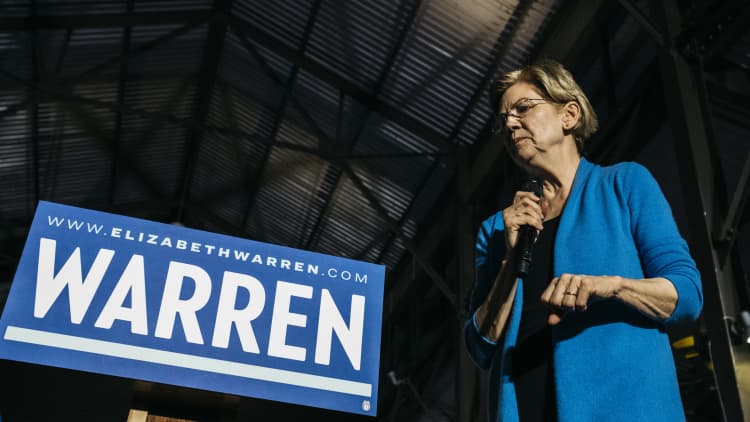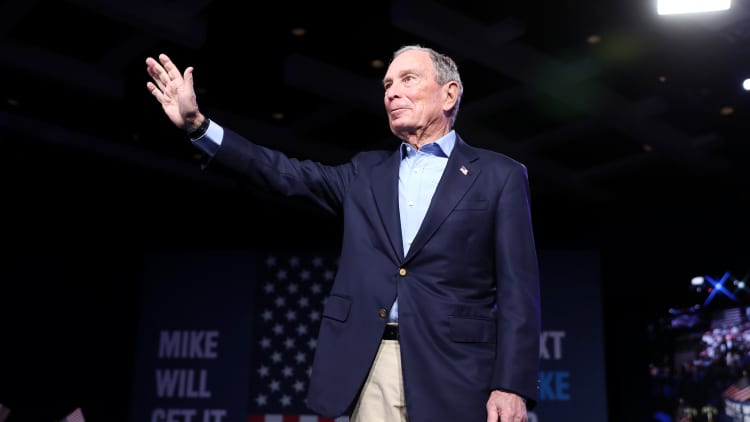
Sen. Elizabeth Warren quit the Democratic presidential race on Thursday, leaving former Vice President Joe Biden and Sen. Bernie Sanders as the last major contenders battling for the nomination to challenge President Donald Trump this fall.
"We didn't reach our goal, but what we have done together – what you have done – has made a lasting difference," Warren said on a call with her campaign staff ahead of the official announcement at an event in Massachusetts, according to a transcript provided by the campaign.
It was not immediately clear if the progressive Massachusetts senator planned to endorse one of her rivals, a move that could be pivotal as Biden and Sanders jockey for a delegate lead. Warren has spoken to both candidates by phone in recent days, though none of the Democrats has said what was discussed.
Warren's exit — like that of former New York Mayor Mike Bloomberg on Wednesday — came after the Massachusetts senator's poor showings in the crucial Super Tuesday contests, when 14 states held primaries, and the territory of American Samoa held a caucus.
Her departure leaves what was once a historically diverse Democratic field essentially narrowed to two white men in their 70s. Sanders is 78 and Biden is 77.
Surrounded by supporters in Massachusetts on Thursday, Warren described her anguish that there would not be a woman nominee in 2020. On the trail, when Warren met little girls, she often bent down to promise them that she would fight for the presidency because "that's what women do."
"One of the hardest parts of this is all those pinky promises. All those little girls are going to have to wait for a woman," Warren said.
Biden and Sanders both praised Warren on Thursday.
"She has run a very strong issue-oriented campaign and the reason that her campaigns ideas will remain viable for many, many years is she has changed political conscience in America," Sanders said.
Biden, in a post on Twitter, called her "the fiercest of fighters for middle class families."
The trajectory of the race has rapidly shifted in recent days, with Biden gaining momentum in the contests that voted on Super Tuesday. Biden won at least 10 states on Tuesday, a dramatic turnaround for a candidacy that very recently looked doomed.
Read more: Supreme Court looks likely to weaken Consumer Financial Protection Bureau but leave it standing
Warren's dismal showing the same day included a third-place result in her own state of Massachusetts, which Biden won, and where she finished 5 percentage points behind the Vermont independent Sanders.
Warren previously failed to notch any wins in the Democratic race's first four nominating contests in February, when Sanders appeared to consolidate support from the party's progressive wing.
The former Harvard Law professor had sought to court that left flank — which flocked to Sanders during the 2016 primary race — with a series of ambitious and detailed policy proposals.
Those plans included a wealth tax on the very rich, and a call to break up Big Tech companies.
Warren alluded to those many plans during her Thursday call with staff.
"What we have done – and the ideas we have launched into the world, the way we have fought this fight, the relationships we have built – will carry through, carry through for the rest of this election, and the one after that, and the one after that," she said.
Despite Warren's plans, Sanders largely retained his hold on left-leaning voters, besting his rival by significant margins in both Iowa and New Hampshire.
Warren came in third in national delegates in the Iowa caucuses, behind Sanders and former South Bend Mayor Pete Buttigieg.
She took fourth place in New Hampshire, behind Sanders, Buttigieg and Sen. Amy Klobuchar of Minnesota
The Democratic race took a dramatic turn after Biden's sweeping victory Saturday in South Carolina, which led to Buttigieg and Klobuchar dropping out and endorsing Biden.
Biden's performance on Super Tuesday then spurred Bloomberg to exit the race and endorse the former vice president. Despite spending more than $500 million on campaign ads, Bloomberg won only American Samoa on Super Tuesday.
Warren's early losses put added pressure on the campaign as it sought to fund a unionized staff of more than 1,000 workers, one of the largest payrolls in the field.
A strong debate performance in Nevada, during which she shredded Bloomberg, brought a fundraising surge.
But the votes didn't follow the money. Warren finished fourth in the Nevada caucuses, behind Sanders, Biden and Buttigieg. She also had a weak showing in the South Carolina primary.
Warren seemed to reference her debate performance against Bloomberg during her remarks to staff, commenting that "in this campaign, we have been willing to fight, and, when necessary, we left plenty of blood and teeth on the floor."
"And I can think of one billionaire who has been denied the chance to buy this election," Warren said.
To support her massive ground operation, Warren rejected traditional fundraising methods, refusing to meet with wealthy donors behind closed doors and instead relying on online contributions from small-dollar donors.
Her campaign received more than 1 million such donations, behind only Sanders in the display of grassroots support.
As the campaign lagged, Warren reverted so some more traditional methods of campaign financing.
She reversed her earlier position on Super PAC support in February, refusing to disavow an outside spending group that deployed millions on her behalf. Persist PAC spent about $15 million, largely focused on Super Tuesday state advertising, ultimately becoming the top outside spending group of the cycle, according to campaign finance watchdog OpenSecrets.

Warren's leftward push inspired pushback from the moderate wing of the party and from the nation's wealthiest individuals. She became a target of Wall Street executives like JPMorgan CEO Jamie Dimon and Goldman Sachs Senior Chairman Lloyd Blankfein. Billionaire financier Leon Cooperman wrote an open letter to the senator, attacking her "soak-the-rich positions," while strategists on Wall Street dubbed her the "Wall of Worry."
But Warren didn't back down. Instead, her campaign ran ads — including ones on CNBC — blasting billionaires and doubling down on her plan.
Those efforts were not enough to draw support from Sanders' loyal base. Despite Warren's ideological similarities to the Vermont senator, her campaign generated some skepticism from some of the most liberal members of the party.
That skepticism grew after Warren released a plan in November to implement "Medicare for All" through multiple pieces of legislation rather than a single bill, backing off her alignment with Sanders on the health-care overhaul.
In the two weeks after she released the plan, Warren saw more than a quarter of her support in national polling averages evaporate. Her support did not recover in subsequent weeks.
The rift between the two progressive senators grew following Warren's January claim that Sanders, during a private meeting with her in 2018, told her that a woman could not defeat Trump in 2020.
Sanders denied the claim publicly during the Democratic debate in Iowa, and his supporters pilloried Warren online.
Warren's campaign manager Roger Lau predicted in a February memo that the nomination process would drag on for months, and he criticized each of the main rival campaigns. The memo said that Sanders "hasn't yet faced the scrutiny of his record that will surely come with any further rise."
In a subsequent memorandum issued on Sunday, Warren's campaign indicated that it was gearing up for a contested convention in July.
"In the road to the nomination, the Wisconsin primary is halftime, and the convention in Milwaukee is the final play," Lau wrote.
President Donald Trump responded to Warren's exit from the race by reprising his derisive moniker, inspired by the 70-year-old's controversial past claims to Native American ancestry.
"Elizabeth 'Pocahontas' Warren, who was going nowhere except into Mini Mike's head, just dropped out of the Democrat Primary...THREE DAYS TOO LATE," Trump wrote. "She cost Crazy Bernie, at least, Massachusetts, Minnesota and Texas. Probably cost him the nomination! Came in third in Mass."



